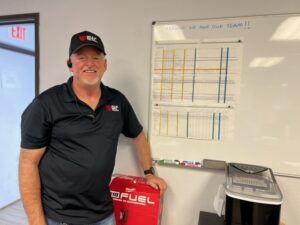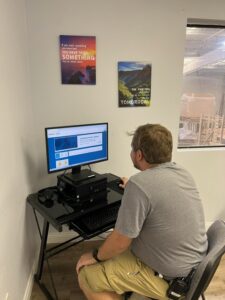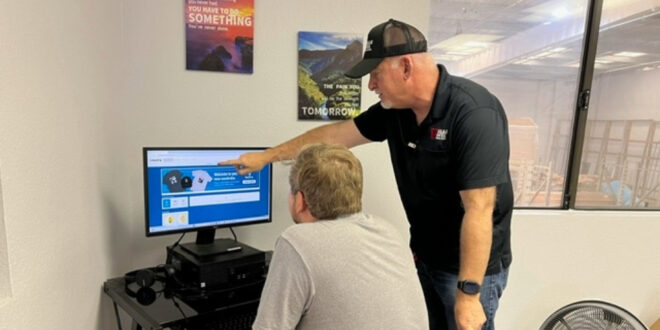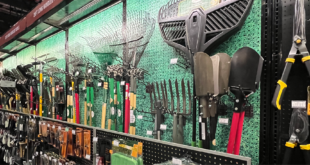If your company uses a learning management system (LMS) for training, there is no need to spend time and energy creating industry-specific training courses. Licensing from the North American Hardware and Paint Association (NHPA) allows you to easily add any of the organization’s many courses to your LMS, and NHPA staff will help you get it set up.
Rodney Bullion, director of learning and development for TAL Building Centers, which has 32 locations in Washington, Oregon, Idaho and Montana, shared with Hardware Retailing the ways licensing has benefited his operation. Bullion has been with the company for six years, starting as a regional manager for the central Washington locations.
Hardware Retailing (HR): Tell us about the development of your current role and why you decided to pursue licensing through NHPA.
Rodney Bullion (RB): When we created my current position, we had 10 or 11 stores, so it was a stretch for a company our size to commit to the learning and development of our greatest asset, our people, in that way. We stepped a little bit outside our comfort zone, but we knew where we wanted to go. We saw the gap between where we were and where we need to be in the future.
Once we established our goals, we knew we needed content, but the dedication of resources to creating content is significant. I looked and tried to leverage resources within our industry and outside of our industry to help us reach the goals we have for our people to learn and grow. That’s when NHPA came into the picture, and they have been a great partner helping us provide content.
HR: How does NHPA partner with you to provide training and education for employees across all TAL Building Centers’ brands?
RB: As we’ve grown to over 30 locations, the consistency and management of training becomes a lot more complex. When I started, I think we had 100 employees; now we have over 600 employees. You can’t effectively provide consistent training and messaging to a team that large unless you have tools to help them do so.
 We looked at a few different learning management system (LMS) platforms, and we wound up with a platform that tied in to other areas of the operation. From there, we developed some of our own content but really wanted to leverage what already existed with NHPA. NHPA’s content is aligned with our industry, but also our culture, and gives us a lot bang for our buck.
We looked at a few different learning management system (LMS) platforms, and we wound up with a platform that tied in to other areas of the operation. From there, we developed some of our own content but really wanted to leverage what already existed with NHPA. NHPA’s content is aligned with our industry, but also our culture, and gives us a lot bang for our buck.
We’ve used NHPA training pretty extensively, and we actually incentivize employees to complete training at three different levels. I have tried to create a culture where learning is readily available because training is what will differentiate us from our competitors. If our employees are more knowledgeable about a product and how it’s used, our customers are going to have more exceptional experiences when they come to our store, and they’re going to want to come back.
Working with NHPA has been a great experience. Before I started, I came from an operational background, but I didn’t know anything about LMS and training. NHPA has experts who care, and when you call, they respond quickly and want you to be successful.
HR: How does NHPA help businesses incorporate key parts of their business into training?
RB: I’ve already said it, but I’ll say it again, NHPA licensing is the easiest path to quality material that I have found that aligns with the industry we’re in. The cost is relatively minimal for what we get, and you have people at NHPA who really care and are invested in your success.
NHPA allowed us to embed the culture of our company into the training, which was crucial to its success. We created a personalized video with Kim Peffley and Scott Wright that included messaging from our leaders about the key results we were looking for. I think making that connection and having a leader relate the importance of training is key. We have our CEO Jason Blair kick off important training sessions and meetings, either in person or with a video, so we can provide context and emphasize the importance of training.
In our partnership with NHPA, and any of our leadership training, it’s a requirement that we pause at key points and have discussions with the leaders in the training to make sure they’re absorbing the material and understand how it relates to being a TAL leader. So I think the customization piece, whether that’s a recorded video or a Teams meeting with your participants on a regular basis, is critical. If you want to get the value out of the training, the training provides content, but those one-on-ones and those meetings provide the context from leadership they need to apply the information.
HR: What are some of the ways you promote a culture of training?
RB: TAL Building Centers has a quarterly employee newsletter, and in each issue, we highlight employees who have completed training to help create excitement for what we’re trying to achieve with training. Also, as an employee completes each level of training, TAL encourages their manager to thank that employee for putting in the effort to train.
For each of the three levels of training, an employee receives a special gift. After Level 1, they get an engraved tumbler, Level 2 it’s a vest and Level 3 is a coat. Plus, completing each level leads to a raise of 25 cents per hour.

We started by offering a raise of 75 cents per hour for completing 40 hours of training, but found that was too overwhelming for most people. So we broke it down into two levels and then three. It’s a lot more digestible, plus they’re getting rewarded more consistently and in a more timely fashion to the investment that they’ve made, which is really important. To keep that momentum, you need to reward close to the investment that’s been made.
Overall, our employees value the opportunity to learn and see training as evidence that we care about them and are going to invest in them. We tell them, “We’re going to upskill you and give you the knowledge, and we hope you stay here for a long time and you apply that, but if you don’t, and you take that with you, and you prosper somewhere else, that’s awesome.”
HR: Do you think that focusing on training and development is a key to success in the home improvement industry? How do you think using training and leveraging can be an asset or beneficial to a team?
RB: Unlike in the past, we’re finding that many of the employees we hire today are not experienced in home repair, home improvement, construction or design. Things are different, and if you want different results, you have to adjust your approach. So our approach is more along the lines of if you align with our core values, if you’re courteous, if you enjoy helping people, if you’re ambitious, if you’re accountable, if you’re safe, then we want you and will teach you what you need to know about the products.
If you don’t recognize the importance of training your people, you’re going to wind up doing everything yourself, because you might have people, but they’re not skilled in the ways you need them to be. And you need to be continually thinking about the future and who you might have to replace employees who retire or move on to different pursuits, and you need to be training those who will take their place.
Our realization of the investment we make in our people around training happens every day. The way it happens is through experiences our employees have with customers, creating those exceptional experiences, which is built on a foundation of knowledge. We achieve that foundation through our training.
With NHPA’s licensing program, you can:
Avoid recreating the wheel. Instead of creating educational content from scratch or searching far and wide for information that fits your business needs, NHPA allows you to get your program off the ground quickly and easily with content created by experts with years of knowledge.
Provide industry-specific content. Unlike other online courses and content you might consider adding to your LMS, NHPA has 43 courses with 273 modules that are specific to the needs of hardware, lumberyard, home improvement and paint and decorating retailers. Plus, the association is constantly developing new content to continue serving its members.
Showcase your brand presence. For many retailers, utilizing their own LMS is a great way to strengthen their company’s branding and online presence. NHPA will provide the content and your company will get the recognition for being a leader among employees with top-notch content from NHPA, a reliable industry leader.
 Hardware Retailing The Industry's Source for Insights and Information
Hardware Retailing The Industry's Source for Insights and Information








